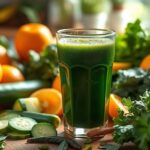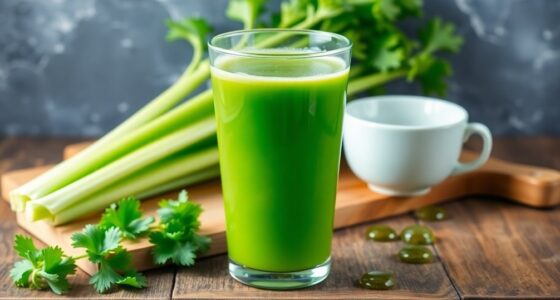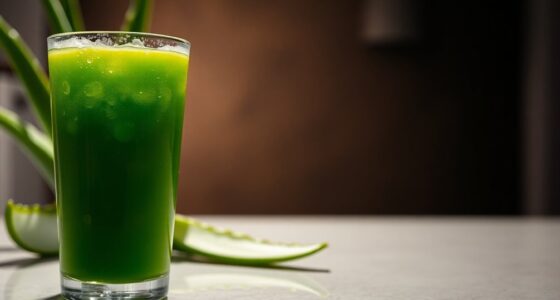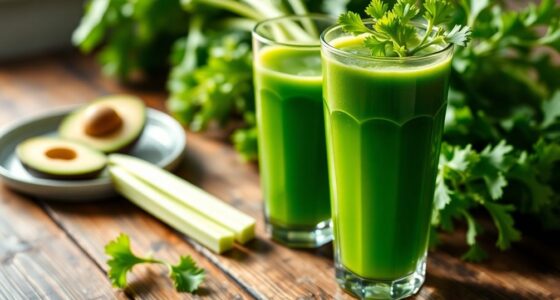Before you jump into a juice diet, think about a few key points. Juice fasting can enhance nutrient absorption, but it may also lead to nutrient deficiencies and muscle loss if not balanced properly. High sugar content can cause insulin spikes and fatigue. Hydration is essential, so pair juices with plenty of water. Shifting back to solid foods requires care to avoid digestive distress. Curious about how to prepare effectively and stay healthy during your cleanse? There's more to explore.
Key Takeaways
- Assess your nutrient intake; a juice diet can lead to deficiencies if not balanced with a variety of fruits and vegetables.
- Monitor your caloric intake carefully; reduced calories may lead to water loss rather than fat loss during a juice cleanse.
- Be cautious of excessive sugar; fruit-heavy juices can disrupt insulin regulation and lead to fatigue.
- Include high-protein vegetables like kale to prevent muscle loss and ensure adequate protein intake.
- Prepare for post-cleanse transition; gradually reintroduce solid foods to avoid digestive discomfort and maintain benefits.
Understanding Juice Fasting
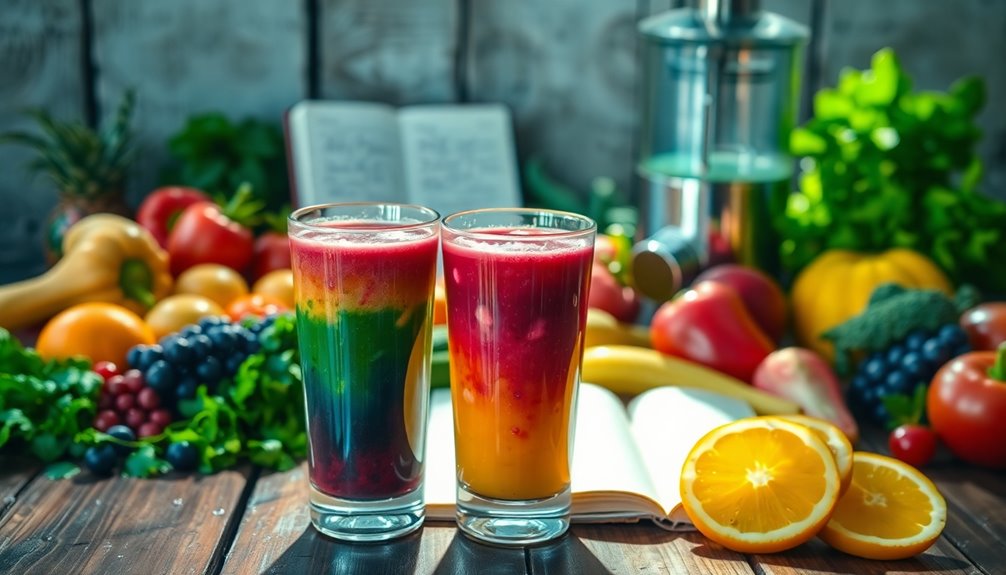
Juice fasting typically involves a short-term regimen where you consume only juices made from fruits and vegetables, often lasting from 24 hours to 10 days.
This juice cleanse focuses on homemade or premade juices, isolating the liquid for concentrated nutrition, while minimizing fiber. To effectively detoxify, you should aim for juices that are about 80% vegetables and include low sugar fruits for flavor without excessive sugar intake.
While many people try juice fasting for weight loss or to reset dietary habits, be aware that potential risks include headaches, fatigue, and nutrient deficiencies if you extend the fast too long. Including suitable fruit juice varieties can help manage these risks and provide essential nutrients.
It's important to approach juice fasting mindfully to avoid these pitfalls and maintain balanced nutrition.
Potential Benefits of Juice Diets
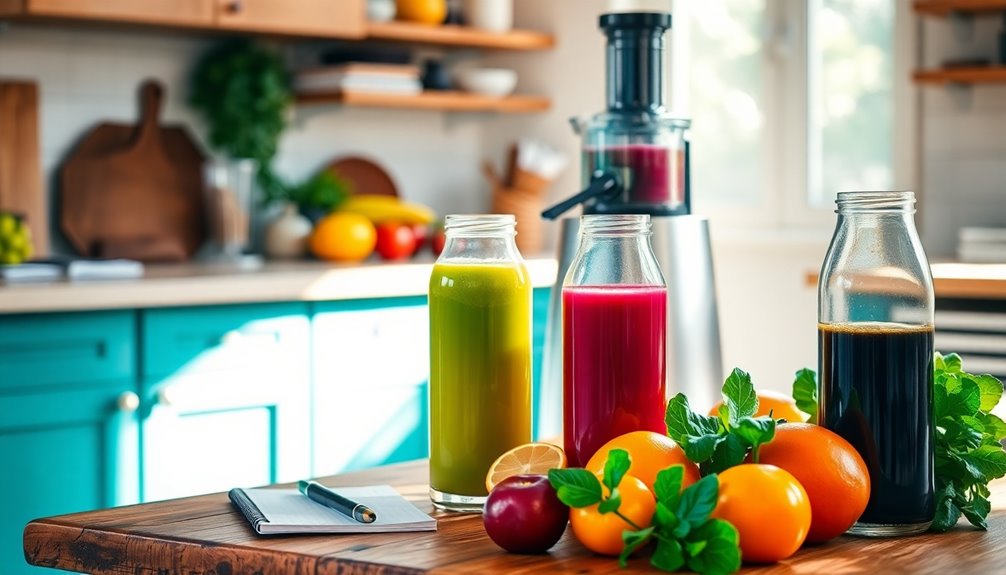
Juice diets can enhance your nutrient absorption by providing concentrated vitamins and minerals without the fiber that often slows digestion.
If you're looking to shed a few pounds, short-term juice fasting might help you lose weight through reduced calorie intake.
Additionally, you may find that juicing supports your digestive system, promoting overall gut health.
Nutrient Absorption Enhancement
When considering a juice diet, one of the standout benefits is its potential to enhance nutrient absorption. Juicing concentrates the vitamins and minerals from fruits and vegetables, allowing your body to digest them quicker than whole foods.
The removal of fiber can lead to higher absorption rates of nutrients like vitamin C and antioxidants, which enter your bloodstream rapidly. Dark green vegetables, such as kale and spinach, are particularly beneficial, providing significant nutrients while supporting your immune function.
Additionally, combining juices with herbs like ginger and turmeric boosts the bioavailability of their beneficial compounds. Opting for low-sugar vegetable juices helps maintain stable blood sugar levels, making it easier for your body to absorb essential nutrients effectively. Moreover, fresh wheatgrass juice can be a powerful addition due to its high vitamin content and energy-boosting properties.
Weight Loss Potential
While enhancing nutrient absorption is a notable benefit of juicing, many people also turn to juice diets for their weight loss potential. A short juice fast can lead to quick weight loss, primarily due to calorie restriction, with studies showing participants losing about two pounds in just three days.
However, this weight loss often results from water loss rather than fat loss, making it a temporary fix. Relying solely on healthy juice can deprive you of essential nutrients found in solid foods, making long-term weight loss unsustainable.
Plus, feelings of deprivation may trigger overeating of less nutritious foods later. Experts warn that insufficient fiber intake could negatively impact your metabolism and gut health, so think carefully before starting a juice diet. Additionally, juice diets may lead to nutrient deficiencies if not balanced, further complicating weight management efforts.
Digestive System Repair
By offering a concentrated source of vitamins and minerals, juice diets can play a significant role in repairing the digestive system.
During a juice cleansing, you eliminate solid foods, allowing your digestive tract to rest. This break can lead to improved digestion and better nutrient absorption when you return to regular eating.
Plus, the hydration from juices helps maintain healthy digestive function and flush out toxins that cause discomfort.
Increasing your intake of fruits and vegetables through juicing positively influences gut microbiota, enhancing overall digestive health.
Short-term juice fasting may also ease symptoms like bloating and indigestion by cutting back on heavy, processed foods. Additionally, incorporating green juice into your regimen can provide high levels of vitamins A, C, and K that further support digestive health.
Embrace the potential benefits and give your digestive system the care it deserves!
Risks and Drawbacks of Juicing
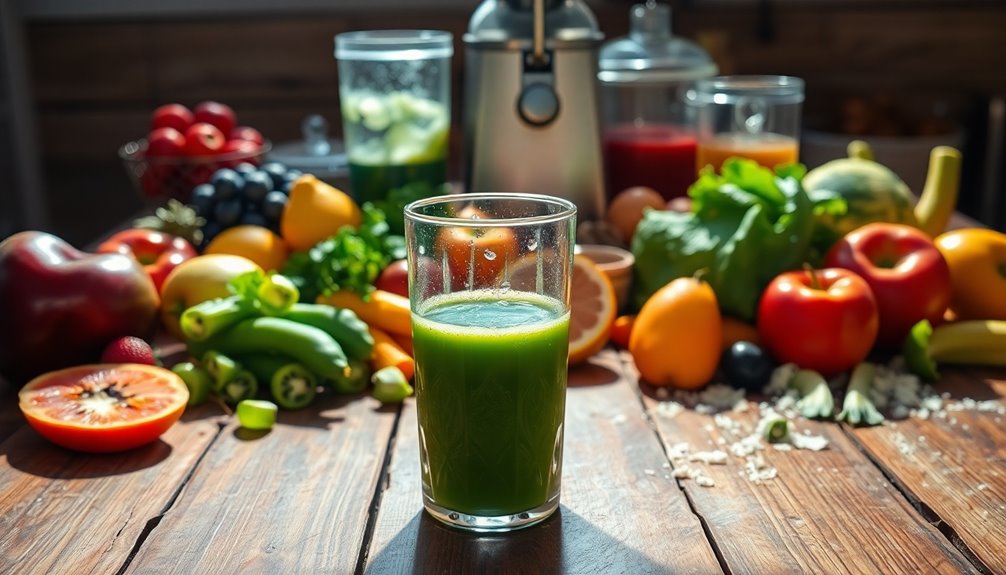
Juicing might seem like a quick way to boost your health, but it comes with several risks and drawbacks that you should consider.
One major concern is nutrient deficiencies; juicing often lacks essential macronutrients and micronutrients, especially protein and healthy fats. This can lead to muscle mass loss over time, slowing your metabolism.
Additionally, the high sugar content in fruit-heavy juices can disrupt insulin regulation, contributing to fatigue and mood swings.
Many people also find juicing to be a form of restrictive eating, which can trigger feelings of deprivation and lead to overeating once the cleanse ends.
Finally, the lack of fiber in juices can harm your gut health, resulting in digestive issues.
Nutritional Considerations During a Juice Diet

When you're on a juice diet, it's essential to incorporate a variety of ingredients to guarantee you get a balanced nutritional profile. You need to be mindful of your caloric intake, as it can easily fluctuate with different juice combinations. Additionally, including detoxifying juices can help eliminate toxins and support your overall health while on a juice diet.
Ingredient Variety Importance
While a juice diet may seem straightforward, ingredient variety plays an important role in ensuring you receive the necessary nutrients for ideal health.
Sticking to a limited range of fruits and vegetables can lead to nutrient deficiencies since no single ingredient provides a complete nutrient profile. Overindulging in specific items, like carrots or beets, might even cause unwanted side effects, such as skin discoloration.
To optimize your juice cleanse, include a diverse selection of ingredients to enhance the vitamins, minerals, and antioxidants in your juices. Aim for a balance between fruits and vegetables, as too much fruit can spike your sugar intake, disrupting insulin regulation. Additionally, incorporating a variety of ingredients can help maximize your vitamin C intake, supporting your immune system during the cleanse.
Balanced Nutritional Profile
To maintain a balanced nutritional profile during your juice diet, it's crucial to focus on ingredient diversity and nutrient density. Aim for a juice blend that consists of 80% vegetables and only low-sugar fruits to avoid nutrient deficiencies.
Incorporating high-protein vegetables like kale and broccoli can help prevent muscle mass loss while ensuring you receive adequate protein. Variety is key—using a range of ingredients daily boosts your intake of essential vitamins, minerals, and antioxidants, reducing the risk of deficiencies.
Don't forget to experiment with spices like ginger and hot pepper; they not only enhance flavors but also provide additional health benefits. By prioritizing these elements, you can enjoy the advantages of a juice diet without compromising your health. Additionally, consider adding chia seeds to your juices for their high fiber content, which promotes satiety and aids in weight management.
Caloric Intake Awareness
How can you guarantee that your juice diet supports your weight loss goals without compromising your health? You need to monitor your caloric intake carefully during a juice cleanse. Additionally, it’s essential to incorporate a variety of nutrient-dense fruits and vegetables into your juice diet for quick weight loss, ensuring you get the vitamins and minerals your body needs. Staying hydrated with water and balancing your juices with whole foods on non-cleanse days can also help maintain energy levels and prevent nutrient deficiencies. Remember, consulting a healthcare professional before starting any restrictive diet is crucial for tailoring the plan to your individual health needs. In addition to monitoring your caloric intake, it’s important to set realistic goals and track your progress throughout your juice diet plan for weight loss. Incorporating physical activity into your routine can enhance the effects of your juice cleanse and support your overall health. Lastly, listening to your body and making adjustments as needed will ensure that your journey towards weight loss is both effective and sustainable.
While reduced calories can lead to weight loss, it often comes from water loss rather than fat loss. To prevent excessive hunger and maintain energy, aim for at least six 16-ounce servings of juice daily.
Incorporate high-protein vegetables into your blends to avoid muscle mass loss, as fruits alone can provide low protein. Also, keep an eye on the sugar content; fruit-heavy juices can disrupt insulin regulation. Additionally, ensuring that your juices are high in antioxidants can aid in metabolism and fat burning.
After your cleanse, tracking caloric intake and ensuring balanced nutrition will help you maintain the benefits and avoid unhealthy eating habits.
Preparing for a Juice Cleanse
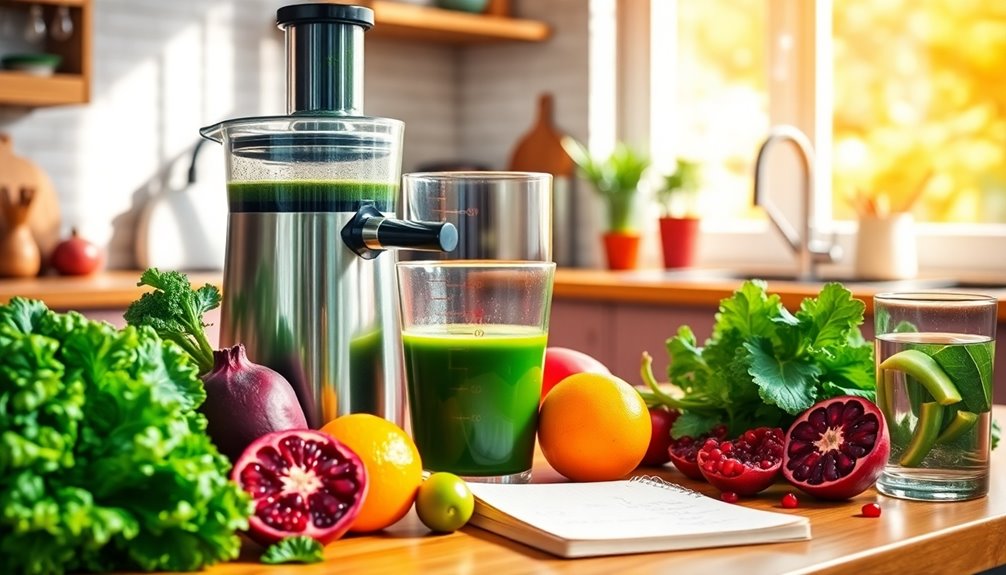
Preparing for a juice cleanse requires a thoughtful approach to guarantee your body is ready for the change.
Start by incorporating more raw fruits and green vegetables into your regular diet in the days leading up to the cleanse. This gradual adjustment helps ease your system into the process.
Focus on smaller portions, eating only to satisfy hunger, which reduces the likelihood of shock when you begin the cleanse.
Maintain regular, non-strenuous exercise to support your well-being and aid in flushing out toxins.
Don't forget to hydrate adequately—drink plenty of water, as proper hydration is essential.
Finally, research and plan juice recipes in advance, ensuring they include a variety of nutrient-rich ingredients for best health benefits.
Importance of Hydration
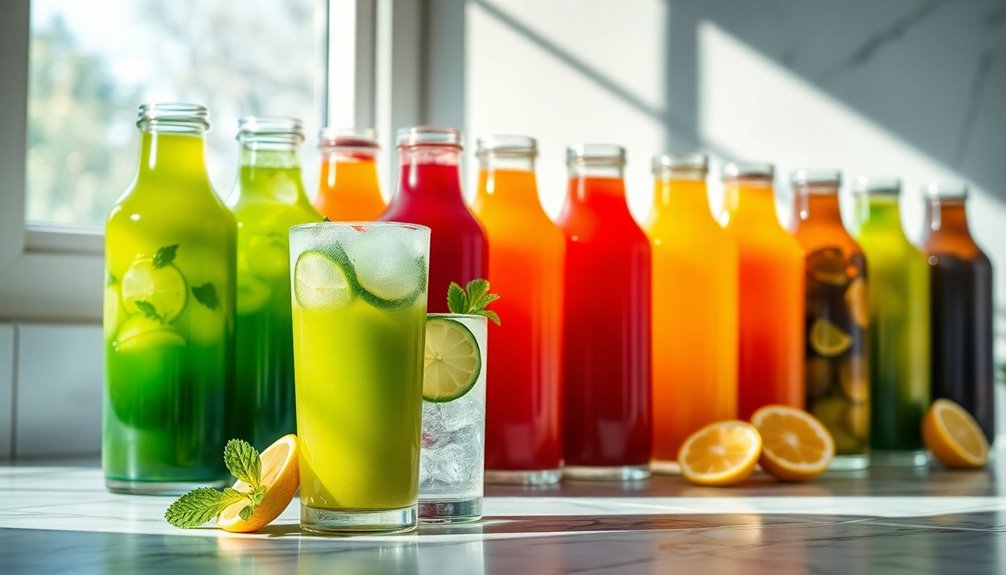
Hydration plays an essential role during a juice cleanse, as it not only helps flush out toxins but also supports your overall well-being. You'll want to drink plenty of water throughout the day, ideally alongside your juices, to help fight off hunger and maintain energy levels. Warm lemon water can enhance hydration and aid digestion, while herbal teas offer additional benefits. Staying properly hydrated is vital for effective detoxification, helping to prevent side effects like dizziness and fatigue. Additionally, proper hydration is crucial for maintaining physical performance and mental clarity during a juice diet.
| Hydration Source | Benefits |
|---|---|
| Water | Flushes toxins, maintains energy |
| Juices | Nutrients, hydration |
| Warm Lemon Water | Aids digestion, enhances hydration |
| Herbal Tea | Hydration, additional health benefits |
Transitioning Back to Solid Foods

As you finish your juice cleanse, it's important to change back to solid foods gradually to avoid digestive discomfort.
Start with small portions and focus on easily digestible options. Here are some tips for altering:
- Begin with smoothies or watery fruits to ease your stomach.
- On the first day, opt for oatmeal, soups, or salads to support digestion.
- Incorporate high-quality, nutritious foods like whole fruits, vegetables, and lean proteins to maintain your cleanse benefits.
- Keep up your hydration with water, herbal teas, or green juices. Low carb diets can help in maintaining energy levels during the transition back to solid foods.
Frequently Asked Questions
How Much Weight Will I Lose on a 7 Day Juice Cleanse?
On a 7-day juice cleanse, you might lose around 2-5 pounds, primarily due to reduced caloric intake and water loss.
However, this weight loss isn't usually sustainable. When you return to your regular diet, you could regain the weight quickly.
It's important to remember that your individual results may vary based on your body composition, metabolism, and activity level.
Always consider how this approach fits into your long-term dietary habits.
How Do You Prepare Your Body for a Juice Fast?
To prepare your body for a juice fast, start by gradually incorporating more raw fruits and vegetables into your diet.
Focus on smaller portions and eat only when you're hungry to ease into lower caloric intake.
Add light exercise to enhance your readiness and stay hydrated by drinking plenty of water.
It's also wise to cut back on processed foods, caffeine, and sugar to minimize withdrawal symptoms and guarantee a smoother shift.
What Not to Do During a Juice Cleanse?
Imagine driving a car without checking the oil; you wouldn't do that, right?
Similarly, during a juice cleanse, don't rely solely on fruits, which can spike your sugar levels. Avoid blending random ingredients; structure matters.
Don't cut calories too drastically, or you'll feel fatigued.
And remember, don't leap in headfirst! Gradually shift to juices to ease your body into the change.
Balance and preparation are key for a successful cleanse.
Can You Lose 10 Pounds on a 3 Day Juice Cleanse?
You might hope to lose 10 pounds on a three-day juice cleanse, but that's unlikely.
Most people typically lose around two pounds, mainly from water weight, not fat. While the drastic reduction in calories can lead to some weight loss, it's not sustainable.
Plus, you risk losing muscle mass due to the lack of protein and essential nutrients. When you return to solid foods, you'll likely regain that weight quickly.
Conclusion
Before you plunge into a juice diet, take a moment to weigh the pros and cons. Sure, it might sound like a quick fix for your health, but remember, even the best ideas can turn into a fad like bell-bottoms if you're not careful. Stay mindful of your nutritional needs, stay hydrated, and ease back into solid foods afterward. With a little planning, you can enjoy the benefits without falling into the juicing trap!
Cindy thoroughly researches juicing trends, techniques, and recipes to provide readers with practical advice and inspiration. Her writing style is accessible, engaging, and designed to make complex concepts easy to understand. Cindy’s dedication to promoting the advantages of juicing shines through her work, empowering readers to make positive changes in their lives through the simple act of juicing.





